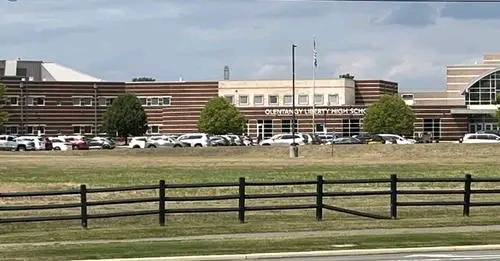
Olentangy Liberty High School: Community Grieves as 9th-Grade Transgender Student Dies by Suicide, Sparking Nationwide Discourse on Mental Health and School Inclusivity for LGBTQ+ Youth
Olentangy Liberty High School: Community Grieves as 9th-Grade Transgender Student Dies by Suicide, Sparking Nationwide Discourse on Mental Health and School Inclusivity for LGBTQ+ Youth”
A Community in Mourning: The Tragic Passing of an Olentangy Liberty High School Student
Powell, Ohio – The town of Powell and the Olentangy Liberty High School community are grappling with profound grief following the tragic suicide of a 9th-grade transgender student. The news, first reported through a Reddit post, sent shockwaves across the community and quickly drew the attention of national LGBTQ+ advocates and mental health organizations. As details remain scarce, the incident has ignited heartfelt conversations about the unique challenges facing transgender youth in today’s schools and the urgent need for more robust mental health support within educational systems.
The student’s identity has not been disclosed, and both the family and school administration have requested privacy, choosing not to release any official statements at this time. However, the ripple effects of this loss have been deeply felt within the Olentangy school district and beyond, as classmates, friends, and community members share their shock and sadness, coming together to express collective grief and solidarity.
The Challenges Faced by Transgender Youth and the Importance of Mental Health Support
The tragic incident has cast a spotlight on the broader mental health challenges that transgender youth often experience. According to the Trevor Project, a leading national organization focused on crisis intervention for LGBTQ+ youth, suicide rates among transgender adolescents are significantly higher than the general population. Research shows that over half of transgender youth in the U.S. seriously consider suicide, with one in three making an attempt. Factors contributing to this high rate include stigma, bullying, family rejection, and a general lack of understanding or support from school systems and peers.
For transgender youth, the school environment can either be a source of belonging or a place of intense stress and marginalization. Advocates stress that a supportive school environment, with resources like LGBTQ+-inclusive counseling services, access to gender-neutral bathrooms, and affirming support staff, can drastically improve students’ mental health outcomes.
The Ohio Department of Education has guidelines to promote safer environments for LGBTQ+ students, though these policies can vary significantly from district to district. While Olentangy Liberty High School is known for its academic achievements, some parents and advocates are now raising questions about whether enough support was in place for LGBTQ+ students who may feel isolated or misunderstood. “Our children are facing complex challenges that require an informed, compassionate response from schools,” said a spokesperson for Equality Ohio, an LGBTQ+ advocacy organization. “We need to look at every possible measure to ensure that students feel safe and valued in their schools.”
The Role of Social Media in Amplifying Support and Awareness
The news of the student’s passing surfaced initially on Reddit, where a user shared the tragedy and expressed condolences. This online post quickly generated widespread attention, drawing comments and messages of support from people around the country who offered words of empathy and solidarity. The outpouring of grief on social media has underscored the extent to which the struggles faced by LGBTQ+ youth are recognized and acknowledged on a broader scale.
However, the incident also raises complex questions about the role of social media in handling sensitive situations. Mental health experts urge caution, as online platforms can sometimes amplify misinformation or increase the potential for harmful responses. The balance between using social media as a tool for raising awareness and respecting privacy is delicate, but in this case, it appears to have played a constructive role in allowing people to share their grief and find community.
Statements from Advocates and Local Leaders
Following this heartbreaking incident, several LGBTQ+ advocacy organizations, such as the Human Rights Campaign and GLSEN (Gay, Lesbian & Straight Education Network), have voiced their condolences and reiterated the importance of addressing the mental health needs of transgender students.
“Every loss of a young person is tragic and unacceptable,” GLSEN’s executive director stated. “We must create inclusive and affirming spaces in schools so that every student, regardless of their gender identity, feels they belong and are supported. This incident is a devastating reminder of the work still needed to make our schools safe for everyone.”
Mental health organizations, too, have chimed in on the importance of comprehensive support services within schools. The American Foundation for Suicide Prevention released a statement emphasizing the importance of integrating LGBTQ+-sensitive mental health services into school counseling programs. In partnership with LGBTQ+ organizations, they are working to distribute resources and crisis information specifically tailored to the needs of transgender and nonbinary youth.
Local leaders in Powell, including Olentangy school district officials, have expressed their condolences and are working with counselors and social workers to support students and staff affected by the tragedy. The district has also begun discussions on possible initiatives to create safer and more inclusive spaces for LGBTQ+ students. Community leaders are emphasizing the need for increased awareness and understanding within the school system to prevent further tragedies.
The Importance of Inclusive Policies and Comprehensive Training for School Staff
While many schools nationwide have taken steps to implement LGBTQ+-inclusive policies, experts argue that policies alone are insufficient without regular, meaningful training for school staff and counselors. These trainings can help teachers, administrators, and mental health professionals develop the skills to understand the unique struggles transgender students face. When conducted effectively, these trainings enable school staff to act as supportive allies and to detect early warning signs of mental distress.
One model for improving inclusivity comes from school districts that have implemented gender-affirming programs. These programs include everything from pronoun training for staff to structured support groups for LGBTQ+ students. Studies have shown that these programs can lead to higher self-esteem and lower rates of depression and anxiety among transgender youth.
Furthermore, advocates are calling for the expansion of student clubs like the Gay-Straight Alliance (GSA) in schools, as these organizations provide safe spaces where LGBTQ+ students can find friendship, validation, and peer support. By fostering an environment of inclusion, schools can play a significant role in reducing the mental health struggles often faced by LGBTQ+ students.
The Need for Legislative Action and Broader Societal Change
The tragedy has intensified calls for legislative measures that support LGBTQ+ youth in Ohio and across the United States. State lawmakers are urged to consider comprehensive protections that promote acceptance and support within educational institutions. In recent years, various states have proposed legislation aimed at restricting or affirming transgender rights in schools. Such proposals can have a powerful impact on transgender students’ mental health, for better or for worse.
Advocates stress that policies promoting LGBTQ+ inclusivity do not only benefit LGBTQ+ youth; they also cultivate a culture of respect and empathy that can improve the learning environment for all students. Additionally, some experts argue that states should mandate mental health programs specifically tailored for at-risk youth populations, including transgender and nonbinary students, in schools across the nation.
Providing Support and Moving Forward: A Community’s Response
As Powell, Ohio, processes the tragic loss of this young student, community members have organized gatherings to commemorate the student’s life and offer support to the family. Churches, local organizations, and community centers have opened their doors to provide counseling services, creating a space for those affected to come together and grieve. Religious organizations in Powell have also been involved in facilitating community healing, though some families have expressed concerns over ensuring that these spaces remain inclusive and respectful of all identities.
Community members have shared their personal stories, showing that although the tragedy is unique, many families have faced similar struggles and losses. This collective sharing of experiences aims to break the silence and isolation that many LGBTQ+ youth feel and to highlight the need for continued efforts to prevent further loss.
School officials, counselors, and parents are working collaboratively to open up conversations about mental health and LGBTQ+ inclusivity. Recognizing that students need a voice in these discussions, the Olentangy school district is considering ways to include student perspectives in policy-making processes, ensuring that solutions are both informed by and tailored to the needs of the youth they serve.
Moving Beyond Tragedy: Transforming Schools into Safe Havens
The loss of a young life serves as a powerful reminder of the urgency to create safe, inclusive environments in which all students can thrive. To truly address the complex challenges faced by transgender youth, school systems must adopt a holistic approach, incorporating both immediate support services and long-term cultural shifts. This means actively engaging with LGBTQ+ organizations, implementing policies that safeguard against discrimination, and fostering empathy through continuous education.
By creating a culture of understanding and compassion, communities like Powell have the opportunity to move forward, honoring the life of the young student and working toward a future where such tragedies become less common. While the pain of this loss will not easily subside, advocates and local leaders are hopeful that this incident can spark meaningful changes within Olentangy Liberty High School and beyond.
Conclusion: A Call to Action for Schools and Communities
The death of the 9th-grade student at Olentangy Liberty High School is not just a tragic loss; it is a call to action. To prevent similar heartbreak, schools and communities must engage in honest conversations about mental health, inclusivity, and the needs of LGBTQ+ youth. This means listening to students, equipping teachers and staff with the skills they need, and committing to policies that protect and uplift every student.
As Ohio and the nation mourn this young life, there is an opportunity for communities to commit to transformative change. By embracing inclusivity, prioritizing mental health resources, and fostering empathy, schools can be reimagined as safe havens where every student—regardless of gender identity or background—feels valued, supported, and empowered.



